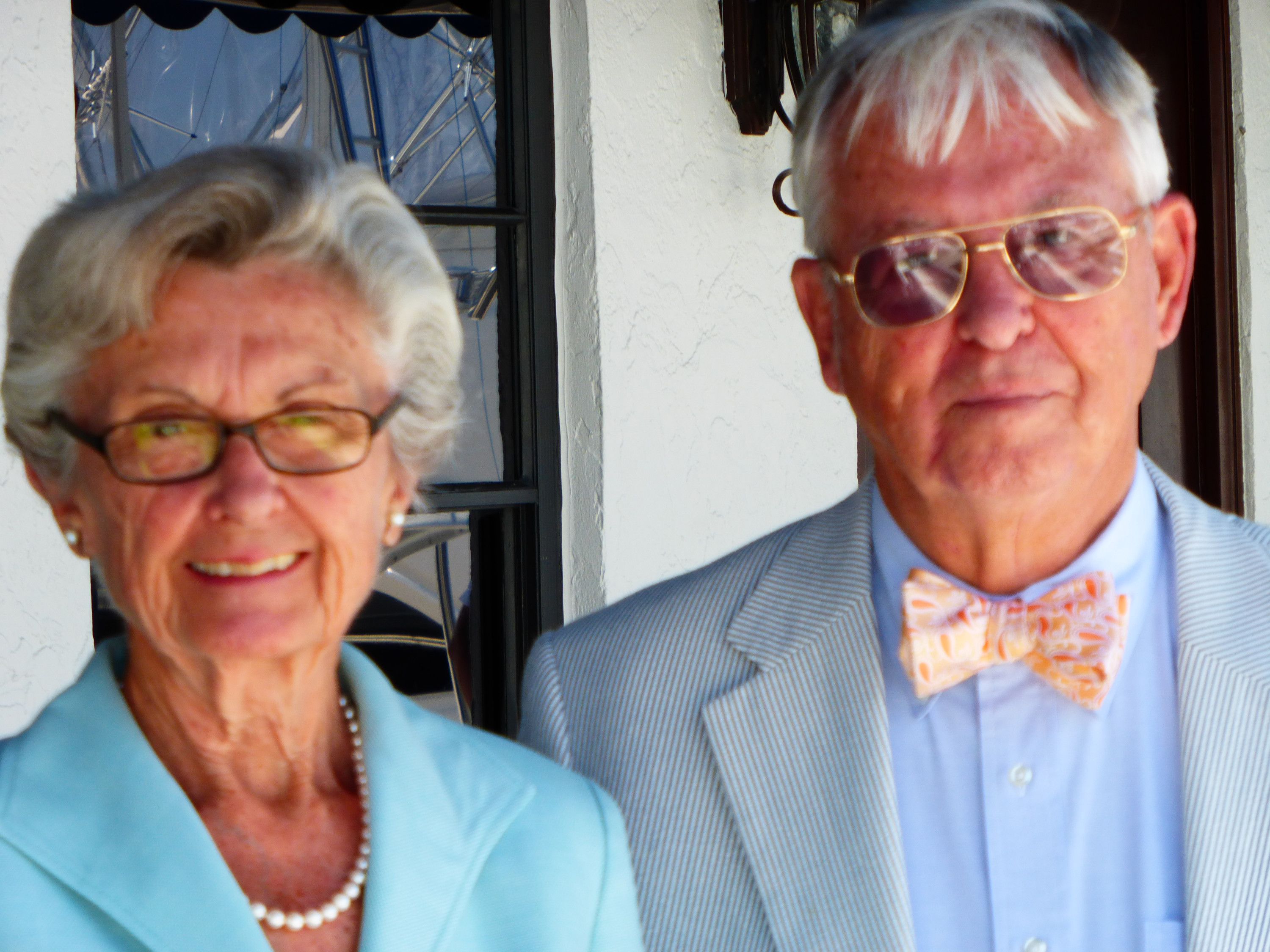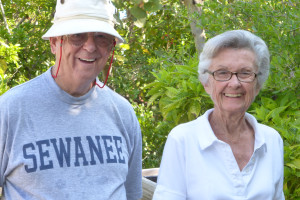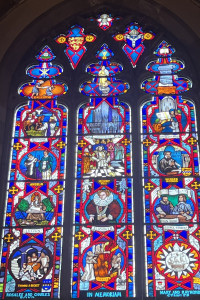"Bill supported and loved many schools—but Sewanee always came out on top."

As a C-130 navigator in the U.S. Air Force and, later, a successful businessman, Bill Stamler, C’56, traveled the world—from France and England to Japan, Australia, and South Africa. He spent his early years in a more local Paris, though: Paris, Kentucky, where he attended high school. When the time came to consider colleges, Stamler was given two choices by his family: Sewanee or Washington and Lee University. Both were all-male at the time, and Stamler selected the option that was closer to home. In deciding to enroll on the Mountain, he transformed both his and the University’s future. Ultimately, he served Sewanee as a member of the Board of Regents and the Board of Trustees, and upon his passing earlier this year, he left Sewanee one of the largest bequests in the institution’s history.
Even if Stamler’s parents were a little overprotective, their instincts paid off. He excelled in his economics major, earning membership in the Order of the Gown at the end of his sophomore year. He also joined Kappa Alpha Order, which changed his life more than he may have anticipated—on a blind date at a KA party, he met his future wife, Ellen, a native of Tracy City, Tennessee. Ellen says that Bill had earlier spotted her swimming at a nearby lake, and he asked around to find out who she was. As it happens, Ellen’s father, Charles M. Boyd, C’29, was a Sewanee graduate and the University’s Phi Gamma Delta advisor. One of Bill’s Fiji friends helped him invite her to a KA party.
As the Stamlers’ daughter, Rose Mary Stamler Dow, describes her parents’ first date, “My grandmother drove my mother to Sewanee, and when my mother arrived, Dad was sitting in the front yard of the KA house playing with a dog. My mother said, ‘I’m not sure which one Bill is, but if he’s the guy who’s playing with the dog, we’ll be in good shape.’” Ellen says she returned to the Mountain nearly every weekend after that. The couple married in All Saints’ Chapel in 1961.
Two months after graduating from Sewanee, Stamler joined the Air Force—the start of an eight-year active duty career that, Ellen says, her husband loved. Initially, he served as a supply officer and was stationed in Japan. After two years overseas, he returned home and trained to become a navigator. Dow says her father enjoyed the experience of living in Japan in the late 1950s, though he occasionally had misadventures. “A favorite story he shared is that he once got lost in Tokyo during a weekend when he was on leave. He sat down in a park with his Japanese-English dictionary and figured out how to ask, ‘How do you get to Tokyo Station?’” Dow says her father summoned his courage and approached an older Japanese man who was wearing a kimono. “Dad bowed and asked the question—and the man looked at him strangely and said in English, ‘Are you addressing me, sir?’”

Both Ellen and Rose Mary say that Bill would have likely stayed in the Air Force until retirement if a family emergency hadn’t interfered. Within a five-year period, both of his parents died, leaving no one to run the family business. At the time, the W.R. Stamler Corporation was a small but growing manufacturer of feeder-breakers for surface and underground mining. “He felt a responsibility to the company’s employees,” Dow says, “so, he left the military. On Aug. 30, he was a captain in the Air Force, and on Sept. 1, he was president of the Stamler Corporation.”
Despite the abrupt transition, Stamler adjusted quickly and thrived in his new role. Working closely with the company’s chief engineer, Charles Anderson, he grew the Millersburg, Kentucky-based business into an international corporation. “I think one of the reasons Bill majored in economics at Sewanee was that he had some idea he might be involved with his family’s business someday,” Ellen says.
Dow attributes her father’s business achievements primarily to his work ethic. “He worked hard and had a great team who supported him,” she says. She also notes that the company had a high-quality product: “A feeder-breaker can break 85% of all mined material.” By the mid-1980s, the company operated branches in South Africa, Australia, and England.
While leading the Stamler Corporation as chairman and CEO, Stamler joined the Air Force Reserves and continued to fly as a C-130 navigator until his retirement as a lieutenant colonel in 1977. Dow says this military commitment included significant travel—and, in fact, he was on an assignment when she was born. “Luckily, it was only in Columbus, Ohio, so he could drive right home.”
In 1990, Stamler sold his family’s company to the Oldenburg Group. Subsequently, Oldenburg sold its mining division to Joy Global, which was bought by Komatsu Mining Corp. “The coal industry looked like it might be on its way out, and Bill knew it was time to go,” Ellen says. Instead of steering a business, Stamler focused on providing leadership in higher education. In addition to his tenures on Sewanee’s Board of Trustees and Board of Regents, he was a trustee at Alice Lloyd College, and he served on the Parents’ Council at Transylvania University, his daughter’s alma mater. “I think he liked being involved with managing organizations and moving them forward,” Dow says, “and he was particularly attracted to higher education because he knew it was important.”
Stamler designated his bequest to Sewanee for three purposes: establishing the Stamler Endowed Scholarship Fund to offer merit scholarships to undergraduates, supporting the University’s Babson Center for Global Commerce, and creating the Charles M. Boyd Endowed Chair in Economics Fund. “This is an extraordinary gift that will help Sewanee cultivate the future Bill Stamlers of the world—leaders who combine sharp business skills with a passion for strengthening their communities,” says Sewanee’s Vice President for University Relations Deborah S. Vaughn, P’20.

Chapel funded by the Stamlers
During his lifetime, Stamler contributed to a broad range of Sewanee causes, including the renovation of Gailor Hall in 2005. Dow says he especially cherished his gift to All Saints’ Chapel, which enabled the installation of a stained-glass window depicting some of the history of the Episcopal Church. The window includes the names of Stamler’s parents, Mary and Raymond Stamler, as well as his parents-in-law, Rosalee and Charles Boyd. It also has a small image of a yellow flag, which was the Stamler Corporation’s logo. “Every time Dad visited the Mountain, he wanted to walk inside the chapel and see the window,” Dow says.
The Stamlers were longtime friends of Vice-Chancellor Rob, C’76, and Phoebe Pearigen, P’14, P’17, stemming from Bill’s time as a regent, and Ellen says she and Bill attended the vice-chancellor’s installation as president of Millsaps College. “Bill’s friendship and encouragement through the years has been a deeply meaningful gift, as was his leadership on the Board of Regents,” Vice-Chancellor Pearigen says. “His tremendous financial generosity is a testament to his belief in Sewanee’s exceptional potential and his faith in our strong history of educating world-changers.”
Though Stamler died shortly before Pearigen was elected to lead Sewanee, Dow says her father would have been delighted by the news. “He always thought Rob Pearigen would be perfect as Sewanee’s vice-chancellor. He just knew it was destined, I suppose.” In a happy coincidence, Transylvania University asked Dow to serve as its representative at Pearigen’s Sewanee installation. “It was extra special that my mother and I got to be there,” she says.
Ellen says Bill took pride in being part of Sewanee’s legacy. “He supported and loved many schools—but Sewanee always came out on top.”

